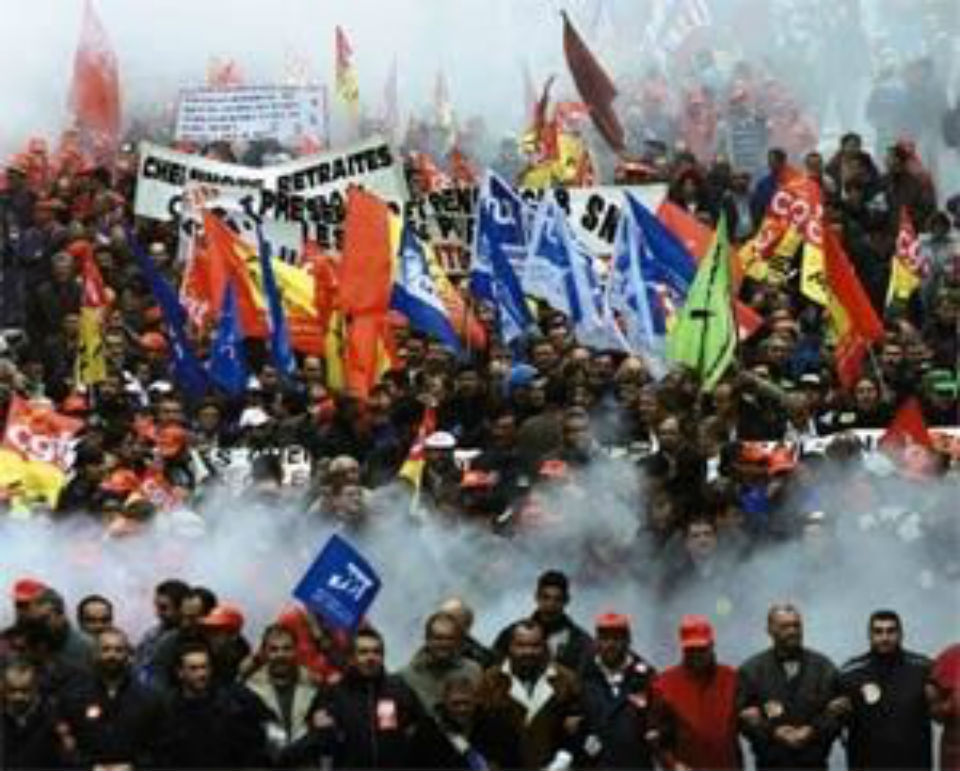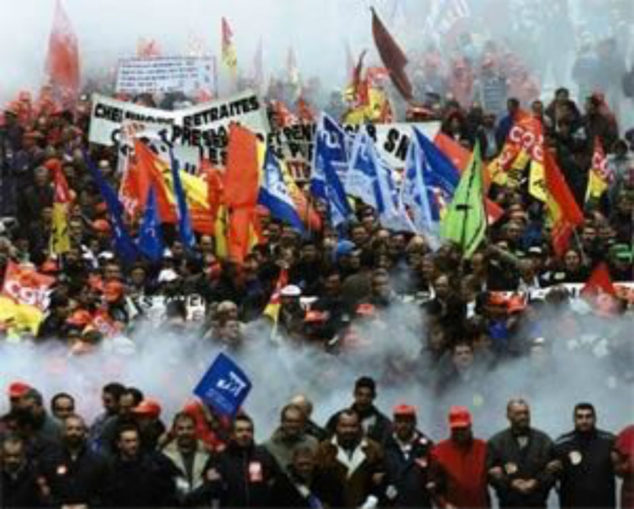

The French Pension Strike of 1995.
Adapted from a speech Workers World Party Chairperson Sam Marcy gave to a party meeting on Dec. 15, 1995 — the same day that the then French government withdrew its plan to cut pensions after militant worker demonstrations. Marcy’s evaluation followed a period of months of massive class struggle in France, with strikes in the public sector including a general strike in transport. Many reports from France’s current class struggle in December 2019 describe today’s strikes as the biggest since 1995. Marcy died in 1998.


The French Pension Strike of 1995.
There was a time in this country when the French revolutionary experience of 1789 was discussed as avidly as the Russian experience of 1917 has been over the last several decades. Paris was the center of revolutionary action and revolutionary inspiration.
It is hard to believe that so much of it has gone by without leaving much of a trace, because the French Revolution was the first really great struggle against feudalism that brought the masses out into the streets. It challenged not only certain feudal practices, like overtaxation, but the whole system. In doing so, they began to question the whole system of private property.
The French Revolution of 1789 is really the beginning of the modern era of socialism in some ways, if you don’t take that literally. Marx and Engels, later Lenin and Trotsky, studied the French Revolution very hard. Many of my generation did, too, because until 1917 it was THE revolution, the model.
They took pride in trying to understand what the differences were among the leaders, why the leaders fought among themselves and why there was so much bloodshed.
Hollywood had to have its say, too. In the movies of the early 1920s there was always some reference to the bloody struggles in Paris. All the mean people were on the revolutionary side. All the good people were well dressed and seemed more like U.S. Americans.
The French Revolution was the beginning of the revolutionary struggle of the oppressed masses everywhere. Its lessons are as important today as 50 or 100 years ago.
For instance, what were the aims of the revolution? Liberty, fraternity and equality were great slogans, but in the end what did they mean to which class?
As Marx and Engels later pointed out, the French revolution helped the establishment of the bourgeoisie as against the feudal class. It destroyed feudalism once and for all.
Nowhere were feudal remnants so quickly and completely destroyed as in France. This terrorized the rulers all over Europe. For instance, when the queen in France was executed, all of England shuddered.
Nevertheless, the British ruling class was afraid not to report that the French had executed their queen. And the very printing of this news aroused the British working class. It did not bring about the great revolutionary turmoil there that existed in France, but that’s because the earlier English Revolution of 1640 had done a lot of the work that the French didn’t do in the 1640s or 1740s — that was left for 1789 and thereafter.
The French Revolution is the example of class struggles unparalleled in history until the Russian Revolution. Whoever wants to understand the relationship of exploiter to exploited and how the interests of the classes are masked, first of all has to study French history. Everything else seems to be an echo of what took place there.
Of course, that’s not true in the United States. The colonies got their independence earlier, in 1776, and didn’t feel they needed a real revolution. They were quick to make friends with the French monarchy. As you recall, Benjamin Franklin went over to France trying to represent U.S. interests. The U.S. American Revolution never took on the character of a revolutionary overturn in property relations.
What we see today [1995] in France is in some ways a continuation of the struggles begun in 1789 — class struggles that ushered in a new propertied class, the bourgeoisie, which got strengthened and became the ruling class.
And now the big question is whether the new struggle is sounding the knell for the ruling class, the bourgeoisie.
What we see in France today is not a revolutionary situation, not yet. It is an important strike, but it is limited by the nature and ideology of the leadership now in control — and also by the conditions.
The important thing in France today is that the masses are willing to listen to ideas for their liberation. They have taken to the streets, they’ve gone beyond what the trade unions have asked them to do. But the big question is, will they go further than that?
Strikes alone do not lead to the revolution. Going out in the streets is an indispensable step, but in itself does not lead to the revolution.
It has to be followed by the next step: the seizure of the means of production, the seizure of the properties. Walking out of the factories is one aspect of the struggle. The next and indeed most revolutionary act is to come back to the factories and take over their management.
In France, the workers have walked off their jobs, especially in the all-important state sector. The next thing is for them to come back and take them over.
Just walking out does not do it. It raises an important and significant protest and it scares the hell out of the bourgeoisie. But it does not lead to that one important act: taking over the reins of society by taking over the means of production.
The workers walk off the job. If done in unison with millions, it’s an act of tremendous revolutionary consequences. The next thing is to come back and take the means of production over, to say we’ve come back not to be subjugated, we’ve come back to manage it.
Many of us know how to manage our jobs, even if we are no longer being directed by the bosses. So the question today is not whether the workers are out or not, the question is whether, when they do go out — which shows an act of defiance and a break with collaboration — will they come back and say, “We are running things”?
It seems such a simple act, so elementary. Yet it has taken centuries for workers to be able to come to that conclusion. And they can come to that conclusion only as a result of conditions — sometimes conditions of starvation, of war. That’s what happened in Russia. They would never have taken over the industries had it not been for the devastation of the war, the hunger caused by the bourgeoisie in prosecuting the war.
So what’s going on in France now is a contest. The bourgeoisie are saying, well, we’re going to play around with them, we’re going to promise something here, promise something there, until they go back to work.
What the revolutionary elements have to say is, well, we want to go back all together, under the condition of taking over the management — which is not such a terrible change because we’re doing it already.
What constitutes a social revolution? Revolution is a change in the form of property. But it’s not only that. It has to be a change in the form of thinking, and the thinking first of all of the leaders themselves.
Has it sunk into them that they have the power in their hands? That they can do it? That the masses are ready for it? That they have learned the art of managing? That there are hundreds of thousands of lower-ranking managers who were sympathetic to the workers’ movement even before the strike began?
As the strike progresses, the question is how to consolidate it and move it further. To say to the government: Move over, we are taking over. It is the essence of the matter. We can do a whole lot of agitation, we can go over a whole lot on what tactical matters can be done. But that is the main thing.
And we hope that the French workers are up to it.
As part of Workers World newspaper’s coverage marking the 50th anniversary of the liberation of…
From the PFLP Central Media Office The following statement from the Popular Front for the…
Newark, New Jersey Over 250 people, representing over 250 New Jersey endorsing community groups, attended…
Special to Workers World The following is a press release issued on April 24, 2025,…
dear Larry Krasner, we heard you sued Elon Musk over his corrupt million election giveaways…
Unions join forces against harassment and deportation of members When 200 immigrant workers – from…